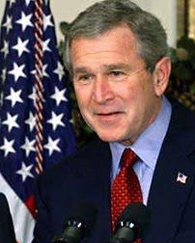President Bush said Tuesday in an interview with Diane Sawyer of ABC News that he could support a constitutional amendment to ban gay marriage.

US President George W. Bush (above) is explicitly against same-sex marriages.
The president waded deeper into the topic during the interview, criticising it as "a very activist court in making the decision it made."
"The court, I thought, overreached its bounds as a court."
Prior to the rulings, while Bush has said he would support whatever is "legally necessary to defend the sanctity of marriage" but has stopped short of endorsing an amendment.
However on Tuesday, Bush told television viewers that "we may need a constitutional amendment" as state rulings such as the one in Massachusetts and a couple of other states "undermine the sanctity of marriage."
"If necessary, I will support a constitutional amendment which would honour marriage between a man and a woman, codify that," he said.
The president has also said that he believes the issue of gay marriage is a state question, rather than a federal one. "The position of this administration is that whatever legal arrangements people want to make, they're allowed to make, so long as it's embraced by the state or at the state level."
But taking into consideration the Massachusetts Supreme Court's decision, which was in favour of gay marriages, he said he would leave the matter up to the states "except and unless judicial rulings undermine the sanctity of marriage; in which case we may need a constitutional amendment."
Bush said he believes his view on the topic does not make him intolerant.
Same-sex marriage is said to be one of the top social issues of the 2004 election. While polls find that Americans are far more worried about economic matters and Iraq than any cultural issue, observers say the same-sex marriage issue is of great importance to the religious conservatives who make up the political base as the it has the potential to be used as a wedge to split voters from a candidate or party they might otherwise support.
Gay groups meanwhile have reacted with anger to Mr. Bush's comments.
"If he endorses amendments such as this, which blatantly discriminates against a class of people, you would then have to wonder who and what is next," said Roberta Sklar, the spokeswoman for the National Gay and Lesbian Task Force.
"I feel like it's [same-sex marriage] an early 1950s argument, like we're arguing if black people should be allowed to eat in the same restaurants as white people," said Chrissy Gephardt, the outspoken lesbian daughter of Missouri Rep. Dick Gephardt, who is aiding her father in his quest for the 2004 Democratic presidential nomination.
Hopefuls Gephardt, Sen. John Kerry of Massachusetts and Retired Gen. Wesley Clark, Sen. Joseph Lieberman of Connecticut, Sen. John Edwards of North Carolina and Howard Dean who as governor of Vermont signed legislation to allow same-sex civil unions, all stop short of endorsing gay marriage but call for Vermont-style, state-sanctioned civil unions. Only Rep. Dennis Kucinich of Ohio, Carol Moseley Braun and the Rev. Al Sharpton - who are all considered long shots for the nomination - endorse gay marriage.











 Printable Version
Printable Version










Reader's Comments
Be the first to leave a comment on this page!
Please log in to use this feature.